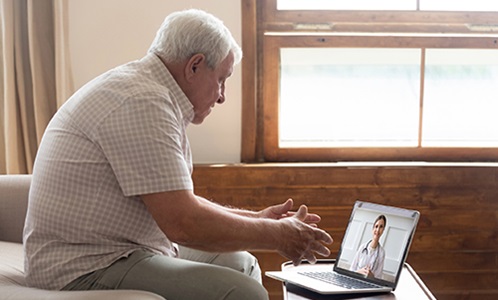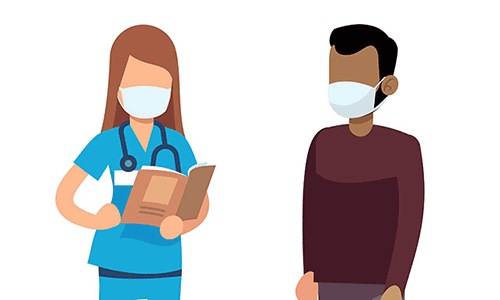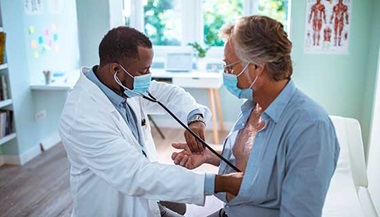Coronavirus and Cardiovascular Disease: Don’t Ignore Heart Symptoms
Featured Expert:
If you have a heart problem, whether sudden or long-standing, working with a doctor is a must. But in the midst of the coronavirus pandemic, not everyone is getting medical help for heart issues — even potentially serious ones, such as heart attack, heart failure, arrhythmias (irregular heartbeats) and others.
Despite the focus on COVID-19, heart problems aren’t taking a break during the pandemic. Cardiologist Charles Lowenstein, M.D., helps explain why patients with cardiovascular disease — and those who are experiencing heart trouble for the first time — should seek care now.
Should heart disease patients see their doctors during the coronavirus pandemic?
Yes. But since the beginning of the coronavirus pandemic, all health care visits in the United States have declined drastically, with some hospitals reporting a drop-off of 30% to 40% of patients.
Why aren’t people going to the doctor? Some are afraid of catching the coronavirus that causes COVID-19 at health care facilities. People living with heart problems might be especially wary, since cardiovascular conditions are associated with severe coronavirus disease and a higher risk of death.
Others might brush off their symptoms, assuming doctors are too busy with coronavirus patients to treat them.
What to Expect During Your Cardiology Telemedicine Visit
If you have a heart condition or are having concerning heart-related symptoms, it is important to get the care you need. Telemedicine, or virtual health visits, offers patients an additional option to consult with their physicians.
Heart symptoms? Two Reasons to Get Seen Now
If you have signs of a heart problem, there are two very good reasons to get help now:
First, for some heart problems, every minute counts. Blocked blood flow to the heart or an abnormal heartbeat need attention right away. A heart attack can result in permanent damage to the heart muscle within 30 minutes. Delaying help could mean you end up with a more serious problem that could result in a hospital stay — or even death.
Second, hospitals are taking steps to prevent exposure to the coronavirus. Doctors and hospitals are ready to care for patients who have problems other than COVID-19.
For instance, at Johns Hopkins, our hospitals are keeping patients safe with these steps:
- Testing and screening of patients and staff members
- Use of masks and protective equipment
- Thorough cleaning and disinfecting
- Physical distancing
- Frequent hand-washing
What are heart attack symptoms?
Some heart attacks come on gradually, with mild symptoms that get worse over time. Others happen suddenly, with more intense discomfort.
If you are having these symptoms, call 911:
- Tightness, a squeezing sensation, pain or pressure in the chest that doesn’t go away after a few minutes, or stops and then returns
- Pain or discomfort in your arms, neck, jaw, back or stomach
- Shortness of breath
- Lightheadedness
- Nausea
- A cold sweat
Do not drive yourself to the emergency department: Call 911 or have someone drive you.
Even if you’re not sure you’re having a heart issue, it’s better to be safe than sorry. Call 911 or get to a hospital, where doctors can examine and treat you promptly.
How are heart attacks different in women?
Heart problems show up differently in men than women. While men’s heart attacks are more likely to cause chest pain and discomfort as a main symptom, heart attacks in women can cause pain in other areas such as the back, neck, jaw or stomach, along with shortness of breath, lightheadedness and sudden fatigue.
Telemedicine Cardiology Services

To request an in-person or telemedicine appointment with a Johns Hopkins cardiologist, call 443-997-0270.
Does the coronavirus cause heart problems?
Some heart symptoms may point to a possible infection with SARS-CoV-2, the coronavirus that causes COVID-19. COVID-19 heart problems can include damage to the heart muscle or blood clots.
Can I get help for chronic heart problems during COVID-19?
Yes. “The pandemic is not affecting the care of anyone who has a chronic or urgent heart or vascular problem,” Lowenstein says. “We’re continuing to see new patients and established patients, and we’re continuing to carry out procedures on patients. If you need urgent care, you and your family should know that we can, and we will, take care of you.
“Our heart catheterization lab is open for business, and if you have a heart attack, or any severe, acute coronary problems, we’re performing cardiac catheterizations. Our electrophysiology lab is open for business. And if you have a heart with abnormal rhythms, we’ll put in a pacemaker or a defibrillator if you need it.”
“We’re here, we’re safe and we’ll take good care of you.”
Charles Lowenstein explains why it’s safe to get help for heart issues, from minor problems to life-threatening events.
What about nonemergency heart issues? Do I have to go to the doctor’s office during COVID-19?
Not always, says Lowenstein. Although it is safe for patients to see their doctors in the office during the COVID-19 pandemic, for some people, there’s an alternative.
Many cardiologists and primary care doctors offer telemedicine, which enables patients to meet with their doctors by computer, tablet or smartphone for consultations and follow-up. It’s an easy, convenient alternative to driving to the doctor’s office to be seen in person.
“We’ll evaluate your situation, and schedule an in-person or virtual visit within the first two weeks after you call us up,” says Lowenstein. “If you have a MyChart account and a smartphone, a tablet or a computer, we’ll schedule you for face-to-face, real-time video visits.”
How can I plan ahead for heart problems during the coronavirus pandemic?
The best time to prepare for a medical emergency is before it happens. Here are some tips:
- Put emergency numbers into your smartphone or post them where you can find them easily.
- For those with known heart disease risk who live alone, consider a wearable medical alert device.
- Keep a two-week supply of all your medications in the house at all times while the coronavirus pandemic is still happening.
- Don’t delay regular doctor visits, which can help you stay healthier in general, and help your doctor spot warning signs of heart trouble.
- Work with your doctor to manage heart attack risk factors such as high cholesterol, diabetes, obesity and smoking.
How Johns Hopkins Medicine Is Keeping You Safe

We know you’re concerned about safety. Learn about the steps we’re taking to keep you safe for your next appointment.







